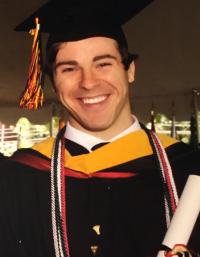Jason Bennett

Jason Bennett
NAF-Fulbright Scholar
I served as president of Ursinus College's Society of Physics Students (SPS) chapter. Our chapter's focus is on extracurricular physics, mathematics, computer science, science outreach, and building an inclusive physics department. I have organized events and incorporated new aspects to our club aimed at reducing the gender (identity), racial, and sexual orientation disparities in the sciences. An event I helped organize as a junior before becoming president was the Hour of Code event for the Spring-Ford Service Unit of the Girl Scouts of Eastern PA. We brought the troop of girl scouts to campus to teach them how fun and rewarding computer science can be. We used interactive games that built code from scratch, and had in-depth discussions about computer science with the particularly enthusiastic scouts.
I began a monthly Physicist of the Month newsletter for SPS that highlighted underrepresented physicists and their contributions to physics after being inspired by Erin Blauvelt, a PhD student with whom I worked closely during my NSF REU at Lehigh University. The goal was to present an inclusive newsletter, and by highlighting physicists regardless of their race, gender (identity), or sexual orientation alongside their contributions to science, we did just that. Our physicists of the month over the course of the year were: Emmy Noether, Satyendra Nath Bose, A.W. Peet, Donna Strickland, J. Robert Oppenheimer, Albert Baez, Katherine Johnson, Chien-Shiung Wu, Karen Uhlenbeck, and Sally Ride. This newsletter is something I would love to continue in graduate school through the physics department or similar student club group emails.
We hosted a local middle school's Lego Robotics team for lectures and demos on magnetism and materials sciences. By hosting a group of diverse students (in race and in gender) and being examples of diverse scientists ourselves (I was the only male in the club), the hope was that they would see `what a scientist looks like' and attempt to emulate us by staying involved in the sciences.
The summer after graduating, I assisted Professor Casey Schwarz, one of the club's advisers, with GAMES (glass and material science to engage students) Science Summer camp, a free summer camp for middle school/high school students interested in the applied sciences, engineering, and scientific experimentation. This was funded by Professor Schwarz's outreach grant from the Ceramic and Glass Industry Foundation (CGIF).
Four other events I organized include: a physics career night, where recent graduates returned to talk about their careers or further education after being Ursinus College physics majors, launching pumpkins with our hand-built trebuchet at the school's Fall Festival, running the design contest for the physics department annual tee-shirt, and an arts and craft event where we built flexible hyperboloids out of barbecue skewers and rubber bands while discussing what life would be like if we lived in an anti-de Sitter universe.
My experience with SPS is one of the things I am most proud of about myself. Ultimately as a professor, I aim to take part in both local and global outreach programs (like the American Physical Society's Bridge Program and Inclusive Graduate Education Network) that would allow me to continue these efforts. As a graduate student I aim to give talks to local underserved middle/high school science classes in the hopes that I can encourage students to consider an education/career in the sciences. Outreach to this demographic is arguably more important than to undergraduates because it can lead the students to have formative future experiences in optional lab science/AP courses in high school that give them an idea of what they intend to study in the future.
